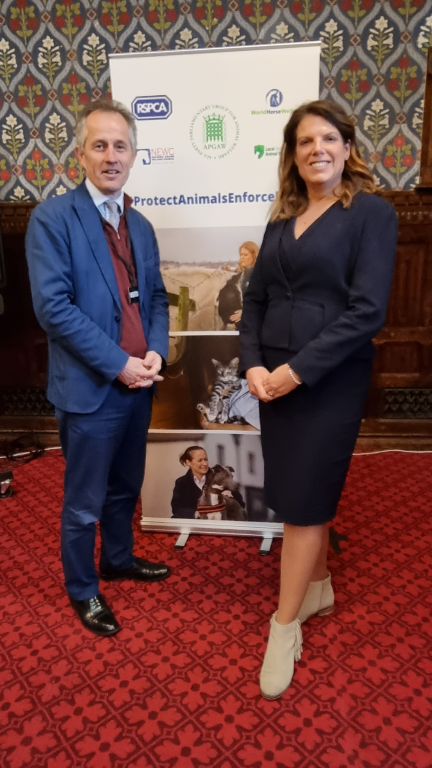
The Rt Hon Caroline Nokes, MP (r) and Roly Owers, Chief Executive of World Horse Welfare (l) at the Roundtable discussion
Animal Welfare Enforcement Shake-up Needed
Call for a New Model of Enforcement for Animal Welfare by Parliamentary Group, Local Authorities and Animal Welfare Charities
At a well-attended Roundtable Discussion at the House of Commons last Tuesday (28 March), organised by the All-Party Parliamentary Group for Animal Welfare and chaired by the Rt Hon Caroline Nokes MP, Members of Parliament and the House of Lords, Local Authorities, the Police, animal welfare organisations and others joined together to discuss how to improve the current system of enforcing animal welfare law, including licensing of activities involving animals.
Legislation can do little to improve welfare for animals, including dogs and horses, without effective enforcement. Whilst there are some excellent examples of positive results for animal welfare, all those present agreed it is not always being protected in the most efficient or effective way.
Representatives from World Horse Welfare, RSPCA, British Horse Society, Dogs Trust, Battersea Dogs and Cats Home, National Equine Welfare Council, the police, vets, City of London, other local authorities and others met to discuss APGAW’s report Improving the Effectiveness of Animal Welfare Enforcementwhich identified concerns with the current enforcement system for animal welfare and suggested that a new model was needed.
The Rt Hon Caroline Nokes, MP and chair of the roundtable said: “The solution to this needs a holistic approach. There are too many fragmented and unlinked issues to take forward and there is a lack of consistency in how different authorities implement legislative requirements and in the enforcement of those requirements.”
Marisa Heath, Policy Advisor for APGAW and author of the report also pointed out that most animal welfare legislation is dealt with by local authorities but that it falls across different departments. She said: “There is not much evidence of joint working, and there are limited resources, inconsistent expertise and lack of training.”
She went on to call on the UK Government to make it a legal requirement for local authorities to use a Dedicated Animal Welfare Officers (DAWO). Acknowledging that many authorities are too small to be able to warrant this, she argued that these dedicated officers should be shared regionally, possibly employed by one authority and contracted out to others in the region.
Marisa said: “We think there should be – at least – regional intelligence sharing and an annual national animal welfare meeting, with two-three regional meetings a year, so that all DAWOs are using the most up-to-date information and approaches.”
An example of this cross-authority sharing was given by Rob Quest MBE of the City of London and Local Government Animal Welfare Group, with a similar model which has been used for decades to bring all the London boroughs together. Rob said: “The animal welfare teams include vets, which are vital to our work, but the smallest councils do not have the resources to support this or indeed to house any animals seized. It makes sense to extend the programme outwards, with councils sharing officers and intelligence. It’s working so well we have recently extended this model outside of London across parts of the south-east.”
Roly Owers, Chief Executive of World Horse Welfare, gave a view from the ground, saying: “Especially at times like this, we need to make best use of what we already have, and this includes the authorities acting upon informed intelligence provided by animal welfare organisation as this will help join the dots between animal welfare failings and linked criminal activities. Local Authorities, the police and animal welfare organisations must work more closely together and support each other, and we believe this can only happen in areas where there are dedicated, well-trained regional animal welfare officers”
Roly also pointed out that we are missing so much valuable intelligence from the ground as the public simply don’t know who to report welfare concerns to, as there is no single point of contact. Roly also referred to the link between supporting human health and welfare and animal welfare, calling for collaborations between the various departments and organisations. He highlighted that so often by supporting people, it allows them to better care for their animals appropriately and so prevent welfare problems.
After the presentations, the group discussion was wide ranging, covering the implications of lack of enforcement on other criminal activities and the non-compliant movements of animals across borders, raising the very real threat of diseases coming into the country. Examples of shared systems resembling the proposed shared hub system were described and shown to be working far more effectively and efficiently. One such shared model was described from Staffordshire where it is being used successfully for farmed animals, and it was pointed out how this could be readily adapted to cover companion animals. Discussions also touched upon puppy farming, licencing of animal premises and the need for consistent, high-quality training for animal welfare officers.
The APGAW working group on enforcement will be using the information discussed to pull together a more detailed plan for the way forward, but it is clear that the system needs to change urgently and that this must be a commitment not just for the present UK Government but for all political parties coming into the General Election next year.
More from World Horse Welfare
- World Horse Welfare statement in response to the UK Government's new Animal Welfare Strategy
- From scared and in danger to safe and cared for – terrified foal dumped by a railway line transforms at Somerset rescue centre
- Equestrians, politicians, academics and a zookeeper to convene at event to explore the world Through the horse’s eyes
- New support service launched to help struggling horse owners
- Social Media: why good horse welfare makes good content

 3 years ago
3 years ago  1488 views
1488 views
